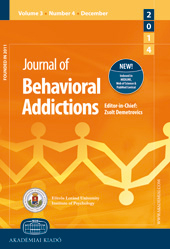Suicidal ideation and history of suicide attempts in treatment-seeking patients with gambling disorder: The role of emotion dysregulation and high trait impulsivity
Suicidal ideation and history of suicide attempts in treatment-seeking patients with gambling disorder: The role of emotion dysregulation and high trait impulsivity
Author(s): Núria Mallorqui-Bagué, Teresa Mena-Moreno, Roser Granero, Fernando Fernández-ArandaSubject(s): Behaviorism
Published by: Akadémiai Kiadó
Keywords: gambling disorder; impulsivity; emotion regulation; suicidal ideation; suicide attempts; psychopathology
Summary/Abstract: Gambling disorder (GD) presents high rates of suicidality. The combined influences of emotion dysregulation and trait impulsivity are crucially important (albeit understudied) for developing strategies to treat GD and prevent suicide attempts. The aim of this study is to investigate the association between trait impulsivity, emotion dysregulation, and the dispositional use of emotion regulation (ER) strategies with suicidal ideation and psychopathological symptom severity in GD. Methods. The sample composed of 249 patients with GD (166 with suicidal ideation) who underwent face-to-face clinical interviews and completed questionnaires to assess psychopathological symptoms, impulsive traits, and ER. Results. Patients with GD who presented suicidal ideation were older and had a later age of GD onset and higher GD severity. Analyses of variance showed higher comorbid symptoms, emotion dysregulation, and trait impulsivity in patients with suicidal ideation. Still, no significant differences were found in the use of ER strategies. SEM analysis revealed that a worse psychopathological state directly predicted suicidal ideation and that both emotion dysregulation and GD severity indirectly increased the risk of suicidal ideation through this state. High trait impulsivity predicted GD severity. Finally, a history of suicide attempts was directly predicted by suicidal ideation. Conclusions. Patients with GD are at risk of presenting suicidal behaviors. The results of this study revealed the importance of comorbid psychopathology in the occurrence of suicidal ideation and the indirect effect of trait impulsivity and emotion dysregulation on suicidality. Thus, suicidal rates in GD could possibly be reduced by specifically targeting these domains during treatment.
Journal: Journal of Behavioral Addictions
- Issue Year: 7/2018
- Issue No: 4
- Page Range: 1112-1121
- Page Count: 10
- Language: Hungarian

